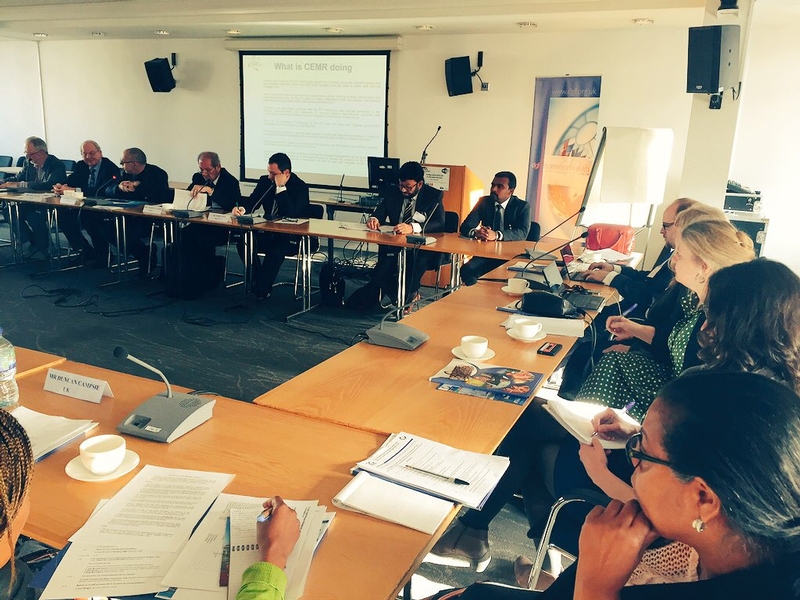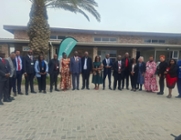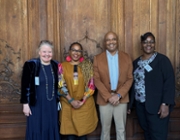European local councils at forefront of refugee crisis

18 November 2015
CLGF members from Europe met on 18 November at Local Government House, London hosted by the Local Government Association of England and Wales (LGA). The main topic for the day was the impact of the current refugee crisis on local governments in countries such as Cyprus, Malta and the UK who all shared their different experiences in responding to the situation.
Since the first quarter of 2014, the number of refugee and asylum applicants in Europe has double from 100,000 a quarter to 200,000. While the system of assessing asylum and setting policy is a national government responsibility, local governments are the organisations dealing with setting and integrating refugees in their areas every day.
As guest speaker at the 2015 CLGF European members meeting, CEMR General Secretary Frederic Vallier emphasised how local governments are at the forefront of the refugee crisis in Europe and need to be prepared to deliver support and services such as housing, healthcare, and food. He said that cities are the first place to receive refugees and provide shelter and need the funds to do this.
He said that it would be beneficial to have better coordination across EU states and across local governments. The EU has some funding mechanisms to support refugees and CEMR is now assessing how these funds could benefit local and regional governments more directly and was pushing for an increase in resources to go directly to local and regional governments.
Mr Vallier said that he hoped CEMR could set up a platform to exchange best practice on refugee management at the local level and would be sending out a questionnaire to local authorities to benchmark activities supporting refugees at local level.
Lord Porter of Spalding CBE, Chairperson of the LGA welcomed the representatives to London and said that the refugee crisis is international but the solutions are local.
Mayor Lazaros Savvides, Mayor of Strovolos in Cyprus and CLGF Board member, said that though national governments take decisions on refugees such as refugee numbers, it is local governments who are at the forefront of integrating them into the community and developing good community relations. He said that local governments can create a good welcome for refuges by innovative activities to share cultural values and ideas.
Dr Marc Sant, President of the Local Councils Association of Malta, described the recent EU summit on migration that had taken place in Malta to bring together European and African heads of state to strengthen cooperation and discuss responses to the current challenges on migration. He described some of the recent tragedies of refugees travelling by boat and said that no-one would put their child in a boat on water unless it was safer than staying on land. Many thousands of people have arrived on the shores of Malta which has a relatively small population of slightly over 400,000.
In a panel discussion with representatives from cities and counties in England, Scotland and Wales a number of issues were highlighted, in particular local government’s responsibility under the Children Act of dealing with unaccompanied refugee children which has place considerable challenges in Kent and other regions, and the problems in accessing appropriate finance to support refugees being settled in different areas, where local government must provide the majority of support services including housing and education..
Speaking on behalf of the wider Commonwealth, CLGF Chairperson Mayor Lawrence Yule said that migration has been a dynamic force in the Commonwealth over recent decades and continues to make positive contributions to the diversity and prosperity of Commonwealth states. He said that the current refugee crisis in Europe has highlighted the pressure in local government as the primary service provide to those seeking asylum. He urged organisations such as the Commonwealth, the EU and UN agencies to come together to focus international efforts and to share experience and good practice to reduce conflict and protect human rights.
Mayor Yule said that it is difficult to foresee where similar crises will arise in future and to plan ahead, but over the next 50 years there is likely to be a significant increase in refugees for environmental reasons from low lying coastal areas and small island states. He said that this would have a particular impact in the Commonwealth where there are many small island states and countries such as Bangladesh with large areas predicted to go under water as a result of extreme weather events and climate change.
Mayor Yule said that the outcomes of the meeting would be fed in to discussions at the forthcoming CHOGM and CLGF would look how to take forward some of the issues as part of its work on making cities and local areas inclusive, safe, resilient and sustainable.
Back to News





